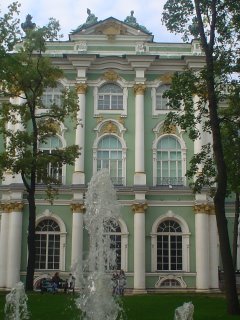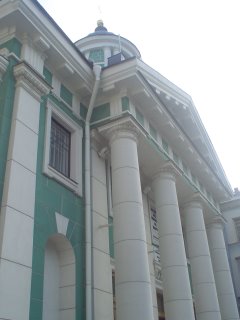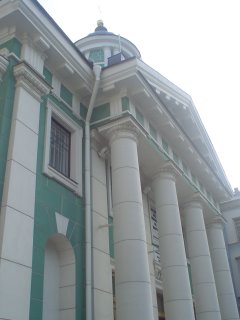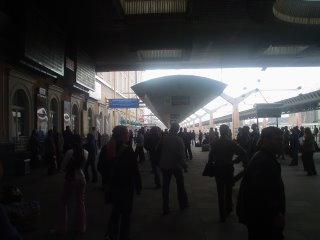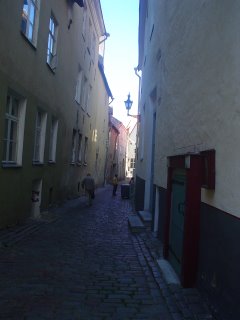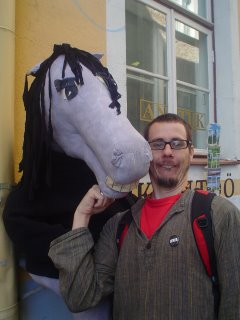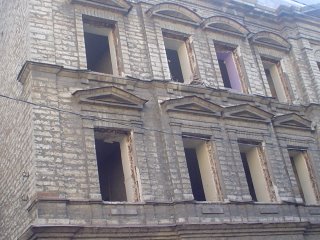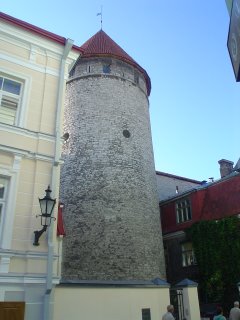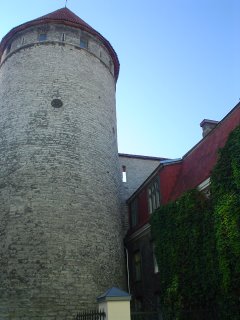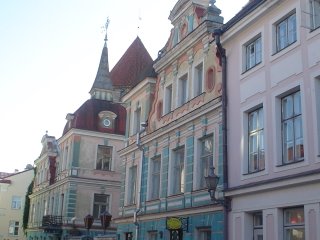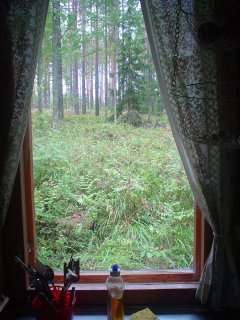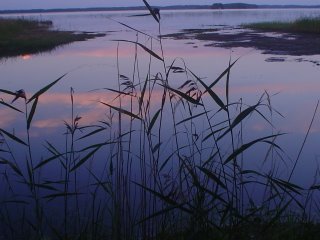We took the bus from Tallinn to St. Petersburg (SP) through the usual military checkpoints, poverty and luxury abounding all the way. Miia's multilingual parade started then in ernest with help from a nice Russian-Estonian lady who flapped her arms and smiled to translate our immigration form. Miia in turn translated it for a creepy Italian tourist and a group of travelling Spanish minstrels, who became omnipresent in SP, before us at every turn.
Six years since my last faraway wander I learned that the Lonely Planet has yet to tire of being wrong: we arrived at the wrong station and hauled 60 pounds each to a nonexistent hostel, during which trek we discovered some of the many intracacies of the SP subway system, which took us back to from where we started and a slightly more expensive than anticipated hostel. Sweet sleep ensued and I dreamed fragments of languages I learned but never mastered: Deutsche, Suomia, bahasa Indonesia, Francais.
We spent a few days roaming SP's Nevsky, eating cheap Russian food, searching for a phone card, and getting ourselves registered (step two of the visa process here). We gazed at gargantuan ornate spectacles like the Hermitage and the Church of the Savior on Spilled Blood (where one of the Nicolas's was done in and to this day tourists fear the smallest street child as a potential assasin and scatter like disorganized gazelles at the site of beggars. Miia was bolder than most and introduced herself to Olga and Anya, who were the kindest of tsar-slayers and let us pose for a picture with them. They were gorgeous children.) Continuing our church tour we visited a Catholic and Finnish Lutheran church that shared the same story of communist oppression including murder and exile of key congregation and staff, having facilities confiscated for public use with all visible traces of spiritual purpose removed, and current fundraising drives to restore facilities for now-thriving memberships. Ressurection.
We had a great visit with Dina at Innovations, an organization dedicated to children's rights including fighting HIV/AIDS and poverty. She was compassionate and committed, informed and inspiring, yet was none to fond of immigrants to Russia and made no bones about making that clear. I guess I can't expect everyone to agree with me that immigrants are no threat to social cohesion and health. They make an all too easy scapegoat and that sentiment is proving itself somewhat universal.
After our meeting we accidentally coughed up big bucks for lattes (we live in a state of perpetual confusion despite Miia's amazing ability to understand people no matter what language they are speaking) and sipped them in front of yet another astounding cathedral, where we were visited by some travelling Jesus freaks led by an American who had no idea he was about to engage in a theological debate with a minister's daughter. She was merciful in her crucifiction. Another universality this one: folks wandering around trying 'save' me. I never seem to find the right words at the time to tell them heaven's here on earth is what I believe, but when it comes to spiritual matters whatever anyone else believes is their own business and probably doesn't need to be sold on the streets.
From there we visited a bizarre 'zoological' museum of dead things with a cool restored woolly mammoth and then took shelter from the falling rain under the naval museum. Everywhere around us were rainy day weddings and smashing champagne bottles. One couple even released doves! We capped SP with fake Indonesian food served by Russians who occasionally mispronounced the names of the dishes, with chopsticks!
And that was just St. Petersburg. More to come...
Chris
Saturday, September 30, 2006
Friday, September 29, 2006
From Tomsk
Now in Tomsk, an overnight train ride east from Omsk. Go figure.
Email and internet access has been pretty sparse so many stories and pics have fallen between the cracks. So it is I find it hard to find the end of the thread to share it all.
We are in Tomsk, a university town of less than 500,000. It's so far the smallest city we've stayed in and, not surprisingly, the smaller it gets the nicer it is. Somehow more familiar, more accessible, more human scaled.
Chris and I took a bit of a day trip today via bus from Tomsk to a small town on the outskirts. Our guidebook heralds the small village of Kolorovo as the quintessential Siberian settlement. It was breathtaking, the taiga (northern pine, fir, spruce and larch forests) are on fire with autumn colours, the small river passing through the town with its gray wooden houses, dirt roads, and an Orthodox church built in 1799. The one bus stop in town had two old women, one selling the wares from her farm. We bought some fresh cheese curds and tried our best to chat with them. They were joyful and warm and bubbled with kindness. We visited the small church and after I asked if it was OK to take photos, a young woman, head covered, came out to find us and ask if we wanted to climb up the bell tower with her. She opened the padlock and led us up the narrow, steep stairs. She is the bell ringer and organist. Again, with our Russian-English dictionary, lots of smiles and hand waving, we shared a small bit of who we are. She was very proud of the church and happy to share it with us. We returned to the women at the bus stop and sat waiting for the bus, watching wedding after wedding come through.
Which, by the way, brings me to a question I seem unable to ask and therefore unable to have answered here. If any of you are Russofiles and know the answer, do tell: Why does it seem that Russian weddings happen all at the same time? Whenever we see a bride, we see four or five brides. All at the same place at the same time. Yet they didn't seem to be getting married in the church at the same time and the wedding parties were not one and the same. People congregated near each other but not together. Why is this?
Other interesting notes. We've been travelling third class all the way up until our trip from Omsk to Tomsk where only second class tickets were left. We paid the double fare and rode in somewhat style. Platskartny (or 3rd class) are open berths (i.e. no doors) where people are packed like sardines, six into a small space. Kupeyny (or 2nd class) has only four people in a berth with wider and longer beds, table cloths, better service, and doors that close. Travelling platskartny, we've met students, pensioners, teachers, military men, dog breeders. There is no shortage of what appear to me older people, farmers, small village residents. As soon as we got into 2nd class, our cabinmates were a fancy couple who covered their coats in plastic bags to keep them clean, talked on their cell phones, pulled out their laptop. They too were nice and shared their grapes with us, but the connection was somehow different and less easy, less genuinely curious. If any of you have read Woody Guthrie's Bound for Glory, I think you'll understand what I'm getting at (yes, Dave, I'm thinking of you). So, our ticket for the day after tomorrow, Tomsk to Krasnoyarsk, will be platskartny all the way. OK the bathrooms are filthy and the air stuffy, but somehow I like the insanity, the melange of people, the way we all share food, conversation, kindness.
Oh my. There is still so very, very much. When we first got to Russia, I was completely overwhelmed. The language barrier in particular was so enormous and everything so complicated, it was exhausting to just walk down the street. But now, somehow, with time, I'm getting used to the rhythms, to communicating in our own particular brand of language, and to Russia in general. Tomsk has been the first town I've actually thought I could settle in for real.
Yesterday we started looking at the "Teach Yourself Chinese" book in anticipation of the same confusion when we get to China. Mongolia will be its own adventure. Chris is looking into meeting up with some throat singers right now.
If I was to say one thing about Russia, I'd have to say two things. The first is that the people, by and large, are extremely friendly, unbelievably helpful, and monumentally generous. They may seem cold at first, but there have been times when we have expected nothing and got everything. Secondly is that yes, this is a different place in so many ways. Sometimes we are saddened when we see things falling apart, especially buildings, or the drab Soviet era apartment blocks. But once you get past all this, past the government stamps on restaurant menus or in bread bags, past the stray dogs and the diesel engines pumping exhaust, past the ancient buses with cracks and rust, you start to see a genuine and deep beauty. Like when you come inside from a sunny day, it takes some time for your eyes to adjust and for you to see fully. Now more than ten days in Russia, little by little the real beauty and ingenuity of this place starts to become evident.
All very romantic, yes? Maybe even a bit cheesy? Maybe. I think I'm pretty good at that.
OK, we'll maybe write more while in Tomsk as this internet cafe is right across the street from our hostel.
Much love to all and everyone!
Miia
Email and internet access has been pretty sparse so many stories and pics have fallen between the cracks. So it is I find it hard to find the end of the thread to share it all.
We are in Tomsk, a university town of less than 500,000. It's so far the smallest city we've stayed in and, not surprisingly, the smaller it gets the nicer it is. Somehow more familiar, more accessible, more human scaled.
Chris and I took a bit of a day trip today via bus from Tomsk to a small town on the outskirts. Our guidebook heralds the small village of Kolorovo as the quintessential Siberian settlement. It was breathtaking, the taiga (northern pine, fir, spruce and larch forests) are on fire with autumn colours, the small river passing through the town with its gray wooden houses, dirt roads, and an Orthodox church built in 1799. The one bus stop in town had two old women, one selling the wares from her farm. We bought some fresh cheese curds and tried our best to chat with them. They were joyful and warm and bubbled with kindness. We visited the small church and after I asked if it was OK to take photos, a young woman, head covered, came out to find us and ask if we wanted to climb up the bell tower with her. She opened the padlock and led us up the narrow, steep stairs. She is the bell ringer and organist. Again, with our Russian-English dictionary, lots of smiles and hand waving, we shared a small bit of who we are. She was very proud of the church and happy to share it with us. We returned to the women at the bus stop and sat waiting for the bus, watching wedding after wedding come through.
Which, by the way, brings me to a question I seem unable to ask and therefore unable to have answered here. If any of you are Russofiles and know the answer, do tell: Why does it seem that Russian weddings happen all at the same time? Whenever we see a bride, we see four or five brides. All at the same place at the same time. Yet they didn't seem to be getting married in the church at the same time and the wedding parties were not one and the same. People congregated near each other but not together. Why is this?
Other interesting notes. We've been travelling third class all the way up until our trip from Omsk to Tomsk where only second class tickets were left. We paid the double fare and rode in somewhat style. Platskartny (or 3rd class) are open berths (i.e. no doors) where people are packed like sardines, six into a small space. Kupeyny (or 2nd class) has only four people in a berth with wider and longer beds, table cloths, better service, and doors that close. Travelling platskartny, we've met students, pensioners, teachers, military men, dog breeders. There is no shortage of what appear to me older people, farmers, small village residents. As soon as we got into 2nd class, our cabinmates were a fancy couple who covered their coats in plastic bags to keep them clean, talked on their cell phones, pulled out their laptop. They too were nice and shared their grapes with us, but the connection was somehow different and less easy, less genuinely curious. If any of you have read Woody Guthrie's Bound for Glory, I think you'll understand what I'm getting at (yes, Dave, I'm thinking of you). So, our ticket for the day after tomorrow, Tomsk to Krasnoyarsk, will be platskartny all the way. OK the bathrooms are filthy and the air stuffy, but somehow I like the insanity, the melange of people, the way we all share food, conversation, kindness.
Oh my. There is still so very, very much. When we first got to Russia, I was completely overwhelmed. The language barrier in particular was so enormous and everything so complicated, it was exhausting to just walk down the street. But now, somehow, with time, I'm getting used to the rhythms, to communicating in our own particular brand of language, and to Russia in general. Tomsk has been the first town I've actually thought I could settle in for real.
Yesterday we started looking at the "Teach Yourself Chinese" book in anticipation of the same confusion when we get to China. Mongolia will be its own adventure. Chris is looking into meeting up with some throat singers right now.
If I was to say one thing about Russia, I'd have to say two things. The first is that the people, by and large, are extremely friendly, unbelievably helpful, and monumentally generous. They may seem cold at first, but there have been times when we have expected nothing and got everything. Secondly is that yes, this is a different place in so many ways. Sometimes we are saddened when we see things falling apart, especially buildings, or the drab Soviet era apartment blocks. But once you get past all this, past the government stamps on restaurant menus or in bread bags, past the stray dogs and the diesel engines pumping exhaust, past the ancient buses with cracks and rust, you start to see a genuine and deep beauty. Like when you come inside from a sunny day, it takes some time for your eyes to adjust and for you to see fully. Now more than ten days in Russia, little by little the real beauty and ingenuity of this place starts to become evident.
All very romantic, yes? Maybe even a bit cheesy? Maybe. I think I'm pretty good at that.
OK, we'll maybe write more while in Tomsk as this internet cafe is right across the street from our hostel.
Much love to all and everyone!
Miia
Wednesday, September 27, 2006
from Siberia
Just a real quick post to say we're alive and well in Omsk, Russia en route by overnight train today to Tomsk. We've been in St Petersburg, Moscow, Kazan, and now Omsk. We've visited Orthodox Cathedrals, Muslim Mosques, Kremlins, Lenin's Tomb, the Red Square... We've met tons of folks, including fellow travellers from Corsica, Australia, and Spain. We've met Tatar Russians, streetkids, a social justice agency with streetkids and folks with HIV, a former actress Regina who took us into her home, a Azerbaijani Muslim religion teacher, a Tatar woman, a young man Ivan en route home from 3 months in the US, a guy in the Russian military en route home from being posted near the Finnish border.
Our Russian sucks and we're doing our best to meet people and make our way. Miraculously I keep randomly ordering food and none of it contains meat. The train rides have been astounding. We saw the rolling Ural mountains covered in fall colours. Rivers, townships, cities. This, it seems, is Russia in all its magnificence and gore - poverty and great wealth side by side.
We are now about 2600km east of Moscow.
That's it for now. Internet access is scarce and Chris' turn is up next.
Much love to everyone out there!
Miia
Our Russian sucks and we're doing our best to meet people and make our way. Miraculously I keep randomly ordering food and none of it contains meat. The train rides have been astounding. We saw the rolling Ural mountains covered in fall colours. Rivers, townships, cities. This, it seems, is Russia in all its magnificence and gore - poverty and great wealth side by side.
We are now about 2600km east of Moscow.
That's it for now. Internet access is scarce and Chris' turn is up next.
Much love to everyone out there!
Miia
Thursday, September 21, 2006
Sunday, September 17, 2006
Yesterday in Tallinn
We locked our 55-pound backpacks in a baggage room on the boat, which transformed itself into a ladies change room just as we re-collected its contents. Suddenly we were surrounded by women of all ages in various stages of changing from oversea afternoon wear into matching lettered t-shirts.
Our first stop was an Old Town Tallinn smoker's haven where hipsters smoked tobacco and that fruity stuff they put in those big hukka bongs. We had a quick coffee and ventured forth for pizza with Katherine, Disney movie with Zinta and Sophia, and a history of the Baltic States' ethnic relations with Harold. [Apparently nobody much likes the Russians around here and the dislike is pretty mutual. The ones left here are the former Soviet administrators and their descendents, none of whom have much interest in learning Estonian. English has become the comprimsed language of neutrality. Even the playground kids get into it.]
After the history museum on the city bus toward the Saku Stadium basketball game, which is nestled between the zoo and a big amusement park, we passed the shanties hiding just off the main road in among the trees. Always jarring to see how poverty gets swept away in the crevaces of wealth.
Later, riding in the back of Harold's company car with surehanded Katherine at the wheel, I proved to Zinta that I could be as fun as Miia by handing her some blank paper and a pen. What ink didn't land on the page swirled into the magic of children's art, abstract images of birds flying backwards and swings spinning spiderwebs.
At the Fall Market, in addition to becoming local folk legends, we ate delicious fried fish and deep fried bread stuffed with cheese, which reminded me of the St. Lucian roadside dish called bakes (essentially deep fried bread with hot sauce). Sophi and I delighted in the sheer quantity of cute puppies. When she collapsed in broken-hearted exhaustion of course it was softie me who picked her up - discipline will never be my strong-point. She won my heart so easily.
We ended the tourist frenzy at the modern art gallery with its immitation Canadian National Art Gallery architecture. I enjoyed the photographs of purgatory, which resembled a gutted military hanger. The exhibit was called 'Crises' which is probably why it was so depressing.
We bought our hosts a Users Guide to Tallin because they have been here less than a year and might not know all its underground contents: everything from where to find the best grafitti to essays on local prostitution and street kids. We hadn't seen any homeless people here but according to this book there are about 30 street kids. They often squat in abandoned housing until they get kicked out or forced out by vigilante arson. There are hundreds of others with housing but living in equally dangerous situations, on drugs, selling their bodies, surviving on crime. There are thousands of others who don't go to school for whatever reason. Most are Russians, though the number of Estonians is increasing. There are also about 20 brothels, and another 50 flats serving as make-shift brothels, and 2-3000 prostitutes, all from poor backgrounds, mostly within Estonia (which is a net exporter of sex-trade workers), and most have become drug addicts. Half report being victimized by the violence of their clients (mostly Finns and other tourists but also local businessmen) or their pimps. This book has oodles of other uncommonly distributed information such as details of skate parks, city flora and fauna, streetraces, Tallinn in films, clubs, etc.
I wish I had the St. Petersburg equivolent, but we do have bus tickets, bread, peanut butter, fruit, and a hand-made pukko (traditional Finnish knife) from Lapland. St. P here we come.
Chris
Our first stop was an Old Town Tallinn smoker's haven where hipsters smoked tobacco and that fruity stuff they put in those big hukka bongs. We had a quick coffee and ventured forth for pizza with Katherine, Disney movie with Zinta and Sophia, and a history of the Baltic States' ethnic relations with Harold. [Apparently nobody much likes the Russians around here and the dislike is pretty mutual. The ones left here are the former Soviet administrators and their descendents, none of whom have much interest in learning Estonian. English has become the comprimsed language of neutrality. Even the playground kids get into it.]
After the history museum on the city bus toward the Saku Stadium basketball game, which is nestled between the zoo and a big amusement park, we passed the shanties hiding just off the main road in among the trees. Always jarring to see how poverty gets swept away in the crevaces of wealth.
Later, riding in the back of Harold's company car with surehanded Katherine at the wheel, I proved to Zinta that I could be as fun as Miia by handing her some blank paper and a pen. What ink didn't land on the page swirled into the magic of children's art, abstract images of birds flying backwards and swings spinning spiderwebs.
At the Fall Market, in addition to becoming local folk legends, we ate delicious fried fish and deep fried bread stuffed with cheese, which reminded me of the St. Lucian roadside dish called bakes (essentially deep fried bread with hot sauce). Sophi and I delighted in the sheer quantity of cute puppies. When she collapsed in broken-hearted exhaustion of course it was softie me who picked her up - discipline will never be my strong-point. She won my heart so easily.
We ended the tourist frenzy at the modern art gallery with its immitation Canadian National Art Gallery architecture. I enjoyed the photographs of purgatory, which resembled a gutted military hanger. The exhibit was called 'Crises' which is probably why it was so depressing.
We bought our hosts a Users Guide to Tallin because they have been here less than a year and might not know all its underground contents: everything from where to find the best grafitti to essays on local prostitution and street kids. We hadn't seen any homeless people here but according to this book there are about 30 street kids. They often squat in abandoned housing until they get kicked out or forced out by vigilante arson. There are hundreds of others with housing but living in equally dangerous situations, on drugs, selling their bodies, surviving on crime. There are thousands of others who don't go to school for whatever reason. Most are Russians, though the number of Estonians is increasing. There are also about 20 brothels, and another 50 flats serving as make-shift brothels, and 2-3000 prostitutes, all from poor backgrounds, mostly within Estonia (which is a net exporter of sex-trade workers), and most have become drug addicts. Half report being victimized by the violence of their clients (mostly Finns and other tourists but also local businessmen) or their pimps. This book has oodles of other uncommonly distributed information such as details of skate parks, city flora and fauna, streetraces, Tallinn in films, clubs, etc.
I wish I had the St. Petersburg equivolent, but we do have bus tickets, bread, peanut butter, fruit, and a hand-made pukko (traditional Finnish knife) from Lapland. St. P here we come.
Chris
Political Animals
End of day and our feet and backs are mighty sore. Lots of walking and then some more walking.
Our third night in Tallinn is drawing upon us as we prepare for our 7am bus trip to St Peterburg tomorrow morning. Tallinn has been very good to us. Here's the skinny:
- A tour of the old town on foot. Lots of pics here on the blog. A gorgeous medieval town that's been preserved and some places now UNESCO sites.
- A visit to the Estonian History Museum as they had an exhibit tracing the links of the East Siberian Aboriginal people and those of Alaska and the Yukon and North-western BC. Very, very interesting although sadly brief.
- 6th row seats at an Estonia-Croatia basketball game; qualifiers for the European Championships. An absolute nail-biting game as Estonia took an early lead, Croatia tied it up in the third period and took a nice lead, and the fourth period was neck in neck the whole way. Finally Estonia won with an incredible 78-77 when Croatia, with a 3 point lead, fouled the star Estonian player as he sank a three pointer and then got the foul shot to take the lead, less than 2 seconds on the clock. Incredible.
- A day spent at the county fair with traditional handcrafts, food, freshly churned butter, local breads, horses, sheep and all the rest. It was also "Chris and Miia" day at the fair - first Chris was invited not once but twice to join the folk dancers in traditional costume, then we were asked to play a game of fish can checkers with a quintessentially surly Estonian man, and finally were judged finalists in our drawing of fish! The checkers game was loudly broadcast by the MC to the crowd, we were Team Canada, and we were easily defeated by the above mentioned surly brute with about 20-30 people standing above us. Still, we came away with consolation prizes - a can of sardines and a can of spratz (no joke) and two fish magnets. We were ashamed by his clean victory but further humiliated when our fish drawing was announced as a finalist in a children's drawing competition (we didn't know it was a contest! we just wanted to draw fish like everyone else!). Luckily we lost that one to a 10 year old girl...
- A visit to the Kumu Art Museum to see some contemporary Estonian art. Some good, some not so good, but fun anyway.
- On foot tour of the city, a trolley ride, and a car ride with Katherine, Zinta, and Sophie. Interesting architecture from medieval to Soviet era to the shining new Stockman towers being built.
- Staying with Canadian friends of a friend and have had a very excellent time with them. The girls are terrific (4 yrs and 14 months) and their parents are cool too. Good talks too about the history of Estonia and Estonia-Russia relations.
All this aside, and all the fancy footwork behind us, I've been thinking some things over. One of the great times we had in Finland was in Jyvaskyla when we visited with my second cousin and her colleagues at the Immigrant Services office. We really got an insight into the country, the system, and what's going on. I'd like to continue in this vein, get to know the actors, the organizers, the people. The touristy stuff is nice and has definitely given us some real food for thought and more mainstream Estonian life (to a certain extent), but what I'd like to do more than anything is get to know Estonians, get to know local people, and get to know what are the issues, the struggles, the politics, and the systems that are here and that are different from what we've seen and known elsewhere.
I think Chris and I are genuinely political animals and so I think it's time to take this travelling a bit deeper as we now go into places where we no longer have contacts. Friends and family in Denmark, Sweden, Finland and Estonia have been great at sharing the places from their own eyes, but we'd also like to start to understand things from a different point of view... Building those solidarity networks that are so vital in the work one does.
A good resolution and hopefully we'll see it bear fruit in the days, weeks and months ahead.
Much love to everyone! Miia
Our third night in Tallinn is drawing upon us as we prepare for our 7am bus trip to St Peterburg tomorrow morning. Tallinn has been very good to us. Here's the skinny:
- A tour of the old town on foot. Lots of pics here on the blog. A gorgeous medieval town that's been preserved and some places now UNESCO sites.
- A visit to the Estonian History Museum as they had an exhibit tracing the links of the East Siberian Aboriginal people and those of Alaska and the Yukon and North-western BC. Very, very interesting although sadly brief.
- 6th row seats at an Estonia-Croatia basketball game; qualifiers for the European Championships. An absolute nail-biting game as Estonia took an early lead, Croatia tied it up in the third period and took a nice lead, and the fourth period was neck in neck the whole way. Finally Estonia won with an incredible 78-77 when Croatia, with a 3 point lead, fouled the star Estonian player as he sank a three pointer and then got the foul shot to take the lead, less than 2 seconds on the clock. Incredible.
- A day spent at the county fair with traditional handcrafts, food, freshly churned butter, local breads, horses, sheep and all the rest. It was also "Chris and Miia" day at the fair - first Chris was invited not once but twice to join the folk dancers in traditional costume, then we were asked to play a game of fish can checkers with a quintessentially surly Estonian man, and finally were judged finalists in our drawing of fish! The checkers game was loudly broadcast by the MC to the crowd, we were Team Canada, and we were easily defeated by the above mentioned surly brute with about 20-30 people standing above us. Still, we came away with consolation prizes - a can of sardines and a can of spratz (no joke) and two fish magnets. We were ashamed by his clean victory but further humiliated when our fish drawing was announced as a finalist in a children's drawing competition (we didn't know it was a contest! we just wanted to draw fish like everyone else!). Luckily we lost that one to a 10 year old girl...
- A visit to the Kumu Art Museum to see some contemporary Estonian art. Some good, some not so good, but fun anyway.
- On foot tour of the city, a trolley ride, and a car ride with Katherine, Zinta, and Sophie. Interesting architecture from medieval to Soviet era to the shining new Stockman towers being built.
- Staying with Canadian friends of a friend and have had a very excellent time with them. The girls are terrific (4 yrs and 14 months) and their parents are cool too. Good talks too about the history of Estonia and Estonia-Russia relations.
All this aside, and all the fancy footwork behind us, I've been thinking some things over. One of the great times we had in Finland was in Jyvaskyla when we visited with my second cousin and her colleagues at the Immigrant Services office. We really got an insight into the country, the system, and what's going on. I'd like to continue in this vein, get to know the actors, the organizers, the people. The touristy stuff is nice and has definitely given us some real food for thought and more mainstream Estonian life (to a certain extent), but what I'd like to do more than anything is get to know Estonians, get to know local people, and get to know what are the issues, the struggles, the politics, and the systems that are here and that are different from what we've seen and known elsewhere.
I think Chris and I are genuinely political animals and so I think it's time to take this travelling a bit deeper as we now go into places where we no longer have contacts. Friends and family in Denmark, Sweden, Finland and Estonia have been great at sharing the places from their own eyes, but we'd also like to start to understand things from a different point of view... Building those solidarity networks that are so vital in the work one does.
A good resolution and hopefully we'll see it bear fruit in the days, weeks and months ahead.
Much love to everyone! Miia
Friday, September 15, 2006
Today in Tallinn
Fastest Blog Ever



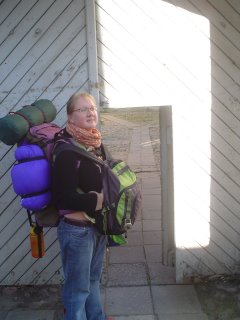

Just got off the boat in Tallinn, Estonia. Walked in the old town with our backpacks and took these pictures. Free internet access at this cafe so may as well take advantage. Meeting up with our hosts in a little over an hour. Life is very, very excellent. Tallinn is gorgeous (from what we've seen already) and my feelings of rush have come to me. Somehow we've been tracing familiar steps so far and this time now, here in Tallinn is new and I am with Chris and we are discovering, uncovering. The reality that we are thousands of kilometres and a million lightyears from home hits me and I feel like I'm floating.
Wednesday, September 13, 2006
Friends' Emails
Here's a bit of an awkward blog for a moment. I REALLY appreciate all the emails and comments and mail we get from our friends. I've (re)learnt this summer how great our friends are and how blessed we are to have them in our lives. It is not an exaggeration to say that every morcel of news and every virtual conversation nourishes and supports. I feel so profoundly honoured to know all of you. Truly.
So it is I don't believe those who say their life is "just this" or "just that". The worst example is a friend from university who recently sent me an email to say she's got a new job with the provincial government as a policy analyst, is travelling around Ontario to talk with Aboriginal communities, and just got engaged. But then she adds that it's not as exciting as what we're up to!?! No, no, no. This sort of humility, although understood as graciousness, just won't do!
So, as a bit of an insight into how fascinating I think you all are, here are a few snippets from some recent emails. The first is from a friend who understands that there are interesting places wherever we are.
She writes:
I have managed to pick up on a few themes though and spent my shower time one day last week composing a list of reasons that might make Kent County an attractive destination for you.
Kent County is a worthy stop on the world tour because
- its farm country, the farmers here help (or don't depending on your view) feed the world
- passing a tractor carrying a double load of tomatoes several times in one outing is something every Canadian should experience
- we have lots of history and all sorts of history. Chief Tecumseh died fighting back the Americans here, Uncle Tom set-up shop at the end of the underground rail road here in Dresden, and Henry Ford used to sail up the Thames to spend the weekend when Chatham was the playground of the wealthy.
- rural poverty, and small town poverty is visible in its own way here and in need of help
- we are host/home to several unique cultures including itnerate farm workers including Mennonites, Jamacians and Mexicans.
- sometimes new Canadians are sent here and wonder what the hell happended?!
- And if that's not enough to lure you, the mall closes at 6pm. Gotta love the small town.
Second, from a friend in Nicaragua, who was one of the kids in the project I worked in but has since graduated and is now working with the streetkids. I love his creativity and complete freedom in expressing himself. He writes (loosely translated from the Spanish):
The phrase that expresses my sentiments in a new word in the world - balgardmermi - and it means that I love you. I invented the word myself, you can use it. Don't worry, it's not patented.
Lastly, from our good friend Jordan Smith. Jordan, born on the same day as Chris and the same Chinese calendar year (they are 12 years apart) has decided to run for city councillor in London, Ontario. Jordan is 19. You should all visit his website at www.jordanward10.com. Jordan's platform is articulate, passionate and informed. That is exciting indeed.
(Chris here with an enthusiastically nodding interlude to highlight just a few of the very cool things some of my friends are up to: one just got a job as a prof in New Zealand, one is buying a house in Cambridge, one has started her own photography business, one just finished her degree in creative therapy, one is the new ED Chinese Canadian Council Toronto, one is thriving in a program where he is learning how to edit video, and of course there are all the new parents I am lucky to know! There are others, I could go on but I'm afraid we'll miss our bus.)
So, all this to say that I think you guys are all awesome. These are just a few examples of the exciting adventures of youse guys. Nevermind the baby bonanzas, that so many of you are doing such fascinating and good work, and that you are all great people just as you are. So, as much as I appreciate all your kind words, I would here now like to raise a toast to YOU. Drink it with relish. (That's relish enjoyment and not relish pickles.)
Miia
So it is I don't believe those who say their life is "just this" or "just that". The worst example is a friend from university who recently sent me an email to say she's got a new job with the provincial government as a policy analyst, is travelling around Ontario to talk with Aboriginal communities, and just got engaged. But then she adds that it's not as exciting as what we're up to!?! No, no, no. This sort of humility, although understood as graciousness, just won't do!
So, as a bit of an insight into how fascinating I think you all are, here are a few snippets from some recent emails. The first is from a friend who understands that there are interesting places wherever we are.
She writes:
I have managed to pick up on a few themes though and spent my shower time one day last week composing a list of reasons that might make Kent County an attractive destination for you.
Kent County is a worthy stop on the world tour because
- its farm country, the farmers here help (or don't depending on your view) feed the world
- passing a tractor carrying a double load of tomatoes several times in one outing is something every Canadian should experience
- we have lots of history and all sorts of history. Chief Tecumseh died fighting back the Americans here, Uncle Tom set-up shop at the end of the underground rail road here in Dresden, and Henry Ford used to sail up the Thames to spend the weekend when Chatham was the playground of the wealthy.
- rural poverty, and small town poverty is visible in its own way here and in need of help
- we are host/home to several unique cultures including itnerate farm workers including Mennonites, Jamacians and Mexicans.
- sometimes new Canadians are sent here and wonder what the hell happended?!
- And if that's not enough to lure you, the mall closes at 6pm. Gotta love the small town.
Second, from a friend in Nicaragua, who was one of the kids in the project I worked in but has since graduated and is now working with the streetkids. I love his creativity and complete freedom in expressing himself. He writes (loosely translated from the Spanish):
The phrase that expresses my sentiments in a new word in the world - balgardmermi - and it means that I love you. I invented the word myself, you can use it. Don't worry, it's not patented.
Lastly, from our good friend Jordan Smith. Jordan, born on the same day as Chris and the same Chinese calendar year (they are 12 years apart) has decided to run for city councillor in London, Ontario. Jordan is 19. You should all visit his website at www.jordanward10.com. Jordan's platform is articulate, passionate and informed. That is exciting indeed.
(Chris here with an enthusiastically nodding interlude to highlight just a few of the very cool things some of my friends are up to: one just got a job as a prof in New Zealand, one is buying a house in Cambridge, one has started her own photography business, one just finished her degree in creative therapy, one is the new ED Chinese Canadian Council Toronto, one is thriving in a program where he is learning how to edit video, and of course there are all the new parents I am lucky to know! There are others, I could go on but I'm afraid we'll miss our bus.)
So, all this to say that I think you guys are all awesome. These are just a few examples of the exciting adventures of youse guys. Nevermind the baby bonanzas, that so many of you are doing such fascinating and good work, and that you are all great people just as you are. So, as much as I appreciate all your kind words, I would here now like to raise a toast to YOU. Drink it with relish. (That's relish enjoyment and not relish pickles.)
Miia
Sunday, September 10, 2006
On Itinerary
Our departure from Kerimäki is in three short days and we won't likely be blogging again between now and then, so here is our very rough itinerary for the next few months; you can follow along on your google maps at home:
Sept. 13, Kerimäki to Helsinki
Sept. 15, Helsinki to Tallinn, Estonia
Sept. 18, Tallinn to St. Petersberg, Russia
Oct. 2, Ulan-Ude, Russia to Kyakhta, Mongolia
Oct. 16, Erlian, Mongolia to Datong, China
Oct. 31-Nov. 2, Shanghai, China to Osaka, Hiroshima, and Iwakuni, Japan (to stay with brother Kevin)
Nov. 18, Tokyo, Japan to London, England
Nov. 21, London to Accra, Ghana
We will blog when possible, but possibly not until Japan as we will be in continual motion through incredibly exotic (to us) places, so don't worry if you don't hear from us for a while.
Chris
Sept. 13, Kerimäki to Helsinki
Sept. 15, Helsinki to Tallinn, Estonia
Sept. 18, Tallinn to St. Petersberg, Russia
Oct. 2, Ulan-Ude, Russia to Kyakhta, Mongolia
Oct. 16, Erlian, Mongolia to Datong, China
Oct. 31-Nov. 2, Shanghai, China to Osaka, Hiroshima, and Iwakuni, Japan (to stay with brother Kevin)
Nov. 18, Tokyo, Japan to London, England
Nov. 21, London to Accra, Ghana
We will blog when possible, but possibly not until Japan as we will be in continual motion through incredibly exotic (to us) places, so don't worry if you don't hear from us for a while.
Chris
Chapter 1 Teaser
Since we expect to be away from blogger for a while, I thought I would leave you with a teaser from the novel I've been working on in Finland. This is the first chunk of the first chapter:
A Hundred Million Love Songs – All Right Here in the First Chapter
Every conversation I have with Bumi is like watching a great foreign movie by the country’s best Director – who you’ve never heard of because of his exotica. Bumi’s stories are glimpses of another planet, another planet with each new story. He paints a picture of life in a concrete quagmire of endless dead-ends with gangsters and witch doctors warring to out-bribe alien politicians, tells you it’s called Makassar and you say, “Oh, Makassar, yes I think I’ve heard of it – it sounds familiar.” He reveals a city make of smoke that floats where pods carry people to markets in which kings eat fruit that smells like farts and you say, “Ah, Jakarta.” His cinema-photographer eyes project images of burning boats and cross-ocean laser beams aimed at inter-biosphere smugglers and you fear for the life of their cargo, even though he’s sitting before you telling the tale.
Today’s fantastic voyage was to a sandy blue paradise for fishermen and their children renting snorkeling equipment to drive-by tourists in 1973. This is where and when Bumi was born, with his face all small and crinkly, brown and wide-eyed wonder at the implausibility of being plucked from his mother’s womb while she lay bleeding on a dirt floor silently and stubbornly refusing to cry out at the pain of birth.
From the beginning Bumi’s eyes pierced harder than any other, glowering while his father forced him to try football, glowing brightly at the chance to help the man count market money from mainland fish sales. By age two he’d humbled his father by becoming a faster and more accurate bookkeeper, who also spoke superior Indonesian, a skill his father exploited for price negotiations with mainlanders. By age four he bored of accounting and took to engineering, devising a cheap and effective net floatation device out of two-litre pop bottles washed up along the shore.
Bumi’s father, a wiry man with surprising strength and audaciously self-granted authority, went looking for the boy late one evening after Bumi failed to come home for supper. On the tiny island of Pulau, population 100, any lost child not found in five minutes was safely assumed drowned. Bumi’s father, Bam, was not overly concerned – Bumi was no likely drowning victim, the first four-year-old potentially smarter than the sea.
Bam found Bumi on the far sloping side of the island where no one had ever bothered to build or settle – it was simply too far away from the others. In recent years it had become a place where the women gathered to make clothing when they wanted to get away from the tourists.
Bumi was there, cursing a foul black streak the likes of which Bam hadn’t heard in all his years on boats, not from his own father or grandfather, nor any other man he’d known.
“Bumi! What’s wrong?” he shouted half in anger and half in concern (a magical mix of fatherly emotion that keeps us from being a threat to ourselves from a young age).
“I can’t get it tied!” Bumi retorted, pointing in frustration at a small tangle of netting he’d somehow dragged across town (about a kilometer) and 30 empty plastic pop bottles he’d collected. “My fingers’re too small!” Too small for his brain.
“Why do you want to tie them?” asked Bam, his anger fading, understanding the immediate objective but not the broader purpose.
“You tie them at one end to make it float, then you can leave it and go play,” Bumi explained. “Then you come back and you have fish. So then you have more time to play with me, Daddy.”
Two clarifications here: 1. Bam was not an exceptionally hard-working man by the standards of Western civilization at the start of the third millennium of measured time. But he did spend six hours a day at sea – six hours Bumi felt would be better spent playing with him. 2. Floatation nets have existed in various fishing cultures for centuries – Pulau’s ignorance of this methodology is in no way indicative of an ignorant, inept, or unintelligent people. In fact, Pulau’s more labour intensive methods were ingenious for keeping the men out of the women’s hair for six hours a day, and vice versa, and for making physically strong, hardy men for an island left naked in the exposure of rain and merciless sun.
Most human beings survive on tradition their whole lives, and Bam had much in common with most human beings, especially the men on Pulau Island. But his son Bumi was among the rare few whose novel ideas change the way a species like ours lives, and indirectly changes the way all life lives or dies. Whether these changes are for better or for worse depends on which change you mean and from whose perspective you look at the results.
Like most human innovations Bumi’s idea had unforeseen impacts. From Bumi’s own perspective, the lighter workload and greater cash flow that resulted from his innovation (once Bam caught on and got to tying what Bumi’s little fingers couldn’t coordinate) led to a bigger, drunker, meaner version of his father. Bumi’s bruisings eventually became so frequent he even resorted to playing football, his way to stay out of the house.
On the pitch (a white strip of sand on the south side) Bumi displayed the same creativity, not with the football (which he avoided touching as much as he could without being insulted by Didi, Anwar and Rachmana – the ‘A’ players who hoped to get on a Makassar team someday and thus avoid the fishing fate) but with play itself.
Under Bumi’s leadership football became ‘Monsters of the Deep’, a complex game of dodgeball played with the feet, in which two of ten players are monsters but no one else knows who, and rolls of dice (acquired on the mainland Muslim black market) determined who was kicking at whom and which boys would be under suspicion of having eaten their fathers. (If only one of them really was a monster Bumi would have brought that boy home for an early feast of fisherman! And kept him for a pet.)
The boys had been playing this game everyday for a week when word got back to Bam through pesky Nur, who had a crush on Bumi, was tired of being ignored, and in her own strike of innovation decided to tattle on the boys’ sacrilege against football and the sea's great creatures.
Bumi’s mother Win was innovative enough to choose that very moment to seduce Bam (thus saving Bumi) for the first time since the drinking began, which is how Bumi’s little sister Alfi was conceived. She became his only sibling and it was plain to all that Bam had drowned even the best swimmers among his sperm.
A Hundred Million Love Songs – All Right Here in the First Chapter
Every conversation I have with Bumi is like watching a great foreign movie by the country’s best Director – who you’ve never heard of because of his exotica. Bumi’s stories are glimpses of another planet, another planet with each new story. He paints a picture of life in a concrete quagmire of endless dead-ends with gangsters and witch doctors warring to out-bribe alien politicians, tells you it’s called Makassar and you say, “Oh, Makassar, yes I think I’ve heard of it – it sounds familiar.” He reveals a city make of smoke that floats where pods carry people to markets in which kings eat fruit that smells like farts and you say, “Ah, Jakarta.” His cinema-photographer eyes project images of burning boats and cross-ocean laser beams aimed at inter-biosphere smugglers and you fear for the life of their cargo, even though he’s sitting before you telling the tale.
Today’s fantastic voyage was to a sandy blue paradise for fishermen and their children renting snorkeling equipment to drive-by tourists in 1973. This is where and when Bumi was born, with his face all small and crinkly, brown and wide-eyed wonder at the implausibility of being plucked from his mother’s womb while she lay bleeding on a dirt floor silently and stubbornly refusing to cry out at the pain of birth.
From the beginning Bumi’s eyes pierced harder than any other, glowering while his father forced him to try football, glowing brightly at the chance to help the man count market money from mainland fish sales. By age two he’d humbled his father by becoming a faster and more accurate bookkeeper, who also spoke superior Indonesian, a skill his father exploited for price negotiations with mainlanders. By age four he bored of accounting and took to engineering, devising a cheap and effective net floatation device out of two-litre pop bottles washed up along the shore.
Bumi’s father, a wiry man with surprising strength and audaciously self-granted authority, went looking for the boy late one evening after Bumi failed to come home for supper. On the tiny island of Pulau, population 100, any lost child not found in five minutes was safely assumed drowned. Bumi’s father, Bam, was not overly concerned – Bumi was no likely drowning victim, the first four-year-old potentially smarter than the sea.
Bam found Bumi on the far sloping side of the island where no one had ever bothered to build or settle – it was simply too far away from the others. In recent years it had become a place where the women gathered to make clothing when they wanted to get away from the tourists.
Bumi was there, cursing a foul black streak the likes of which Bam hadn’t heard in all his years on boats, not from his own father or grandfather, nor any other man he’d known.
“Bumi! What’s wrong?” he shouted half in anger and half in concern (a magical mix of fatherly emotion that keeps us from being a threat to ourselves from a young age).
“I can’t get it tied!” Bumi retorted, pointing in frustration at a small tangle of netting he’d somehow dragged across town (about a kilometer) and 30 empty plastic pop bottles he’d collected. “My fingers’re too small!” Too small for his brain.
“Why do you want to tie them?” asked Bam, his anger fading, understanding the immediate objective but not the broader purpose.
“You tie them at one end to make it float, then you can leave it and go play,” Bumi explained. “Then you come back and you have fish. So then you have more time to play with me, Daddy.”
Two clarifications here: 1. Bam was not an exceptionally hard-working man by the standards of Western civilization at the start of the third millennium of measured time. But he did spend six hours a day at sea – six hours Bumi felt would be better spent playing with him. 2. Floatation nets have existed in various fishing cultures for centuries – Pulau’s ignorance of this methodology is in no way indicative of an ignorant, inept, or unintelligent people. In fact, Pulau’s more labour intensive methods were ingenious for keeping the men out of the women’s hair for six hours a day, and vice versa, and for making physically strong, hardy men for an island left naked in the exposure of rain and merciless sun.
Most human beings survive on tradition their whole lives, and Bam had much in common with most human beings, especially the men on Pulau Island. But his son Bumi was among the rare few whose novel ideas change the way a species like ours lives, and indirectly changes the way all life lives or dies. Whether these changes are for better or for worse depends on which change you mean and from whose perspective you look at the results.
Like most human innovations Bumi’s idea had unforeseen impacts. From Bumi’s own perspective, the lighter workload and greater cash flow that resulted from his innovation (once Bam caught on and got to tying what Bumi’s little fingers couldn’t coordinate) led to a bigger, drunker, meaner version of his father. Bumi’s bruisings eventually became so frequent he even resorted to playing football, his way to stay out of the house.
On the pitch (a white strip of sand on the south side) Bumi displayed the same creativity, not with the football (which he avoided touching as much as he could without being insulted by Didi, Anwar and Rachmana – the ‘A’ players who hoped to get on a Makassar team someday and thus avoid the fishing fate) but with play itself.
Under Bumi’s leadership football became ‘Monsters of the Deep’, a complex game of dodgeball played with the feet, in which two of ten players are monsters but no one else knows who, and rolls of dice (acquired on the mainland Muslim black market) determined who was kicking at whom and which boys would be under suspicion of having eaten their fathers. (If only one of them really was a monster Bumi would have brought that boy home for an early feast of fisherman! And kept him for a pet.)
The boys had been playing this game everyday for a week when word got back to Bam through pesky Nur, who had a crush on Bumi, was tired of being ignored, and in her own strike of innovation decided to tattle on the boys’ sacrilege against football and the sea's great creatures.
Bumi’s mother Win was innovative enough to choose that very moment to seduce Bam (thus saving Bumi) for the first time since the drinking began, which is how Bumi’s little sister Alfi was conceived. She became his only sibling and it was plain to all that Bam had drowned even the best swimmers among his sperm.
Subscribe to:
Posts (Atom)

